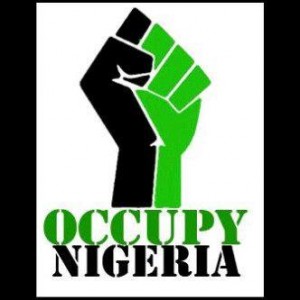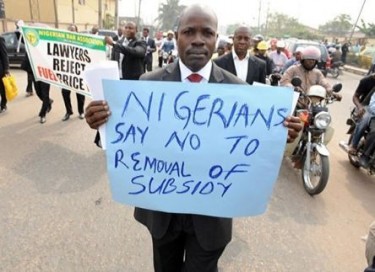This post is part of our special coverage #Occupy Worldwide.
Occupy Nigeria is a national protest which began in Nigeria on Monday, January 2, 2012. The civil outrage is organized by trade unions who are incensed by the removal of fuel subsidy by the government. The protest has been fueled by the democratization of information as personified by young Nigerians through their use of social media. For days, the nation had been shut down: no one worked, earned or learned.
The synergy between online and real time protest was articulated by African Urbanism:
As a lover of communications, media and especially social media, there are two things about this movement that make me especially excited: 1) First, the impressive role that social media is playing in terms of documenting and for coordinating activities and 2) the astounding amount of people that are making use of this medium to make their voiced heard… “Follow #occupynigeria #fuelsubsidy for just a couple minutes and you'll see precisely what I'm talking about — in a highly mobile country of more than 150 million, tweets are coming in so fast at times its almost impossible to keep up with the conversation.
The Nigerian government insists that the deregulation of the petroleum sector is not only a panacea for development but also a means of strangulating corruption in the industry. This is part of economic reforms spearheaded by the President, Dr Goodluck Jonathan with the support of Coordinating Minister for the Economy, Ngozi Okonjo-Iwealla (@NOIweala) and Sanusi Lamido Sanusi (Governor of the Central Bank).
The position of the government in ending the fuel subsidy was articulated in this article by Sanusi:
Fraud like theft thrives not only because of the existence of greed and benefit but of opportunity… 1. You can off load 5,000 MT and bribe customs and other officials to sign papers confirming u offloaded 20k MT. Then do the same across the chain with a paper trail showing you delivered 20k MT to a tank farm, and maybe even that u transported it to Maiduguri entitling you to a share of the price equalization fund. Maybe for N20-N30 per litre u bribe all those who sign the papers. The 15k MT you take to Benin or Ghana or Cameroun and sell at market price thus making an additional “profit” of N55/ltr on 15,000MT! 2 you can just forge documents and have them stamped without bringing in anything and collect the subsidy-PPPRA pays based on DOCUMENTS. 3 you can bring in the fuel, load on tankers, sell some at N65N some at 80 some at 100 some across the land borders. You can do all this and no one can catch it or prove it because somebody was paid to sign off on docs. And with a high enough margin there is too much temptation to be resisted and firepower for bribing officials.
In effect, the Nigerian state has been subsidizing fuel, not for the common man/woman in the street but for some rent-seeking parasites. Nonetheless, Sanusi frankly explained that in addition to removal of subsidy, corruption and wasteful government expenditure has to be curtailed:
Finally: removing subsidy is not a silver bullet that solves our economic problems. And there is a huge trust deficit that government has to address. Government needs to investigate subsidy payments and punish any violations of extant guidelines. It needs to cut on unnecessary and wasteful expenditure. It needs to fight corruption and show seriousness in that. It needs to deliver on capital projects, power and infrastructure including irrigation, farm-level storage and agri-processing. These are all valid issues that are to be taken IN ADDITION to and not in place of subsidy removal.
However, this stance of the government has neither convinced labour nor civil society. @ toluogunlesi asserts here that:
But over time corruption has crept into the system, and dubious importers have found ways of inflating their receipts. Between January and October 2011, the government claims to have spent 1.3 trillion naira (about $8bn) on subsidies, instead of the budgeted N248bn. The government has admitted the existence of a cartel, but has done nothing to confront or expose it. The only solution, they've argued, is to scrap the entire subsidy, the only thing that resembles welfare in a land teeming with poor people.
As @toluogunlesi maintains, it’s a matter of trust:
At the root of the opposition is a trust deficit. So for Enough is Enough Nigeria and most Nigerians, the conversation is not merely about the fuel subsidy, but about a wasteful and corrupt leadership, given to making false promises and asking citizens to sacrifice for a better future. The message to President Jonathan and his government is simple: earn our trust with the trillions you already have in your possession, then we can, and will, wholeheartedly hand over this subsidy trillion to you.
Nigerians have always mistrusted their leaders due to many years of broken promises. In a blog post, @feathersproject concurs with @toluogunlesi that government wasteful spending has changed the conversation about the protest:
Occupy Nigeria … is certainly no longer about fuel subsidy but about the basic tenets of democracy and good governance. He who seeks equity must do so with clean hands. If government prescribes austerity for her citizens, then our leaders must also feel the pinch. Anything else is scandalous hypocrisy!
In a rejoinder to Sanusi's write-up, Tunji Olatunji advocates a more humane solution:
A protestor holding a placard that reads: 'NIGERIANS SAY NO TO REMOVAL OF SUBSIDY.' Photo courtesy of starafrica.com (via myweku.com).
Like the Yorubas would say “ori bibe ko ni oogun ori fifo”. This means that you cannot recommend beheading a man as a prescription for his headache. Yes we know that beheading a man would end the headache, but the cost to the man is the ultimate price. This is why it is my view that further impoverishing Nigerians with the domino impact of the oil subsidy removal at a time when the nation is grappling with the menace of religious and politically motivated mass killings is an exercise that suggest that those in charge of national policy decisions are too far detached from the reality on our streets and have sanity that leans towards cruelty. Their choice of time to introduce their volatile and controversial economic policy, which coincided with a time hundreds are being slaughtered in a part of the country while other parts are threatening reprisal attacks indicates that they lack any scintilla of patriotism in them. The real opportunity cost of a reform in that sector at this time should be the denial of further opportunities for those who abused or took advantage of the system via a change in processes empowered by appropriate relevant modern technology.
Occupy Nigeria movement has also spread as far as the United Kingdom. MyWeku interviewed one of the main organizers of Occupy Nigeria (UK), Nicholas Ibekwe:
Q:The Occupy movement is now synonymous with protests that relate to social and economic injustice worldwide. The “Occupy” tag, however, especially for a distinctly Nigerian or African movement seems unoriginal. Were there discussions amongst organisers to come up with a more African name or slogan?
A: Like you acknowledge in one of your questions, the Occupy movement is synonymous with protests around the world. So, it was only normal for the popular revolt in Nigeria to be christened after the Occupy trend. This inevitably has helped to attract attention to the protest back home even as the government is doing everything to silent the Nigerian media (electronic) from broadcasting it to the world. But with the help of social media and the Occupy tag attached to the struggle young Nigerians who have always yearned for a change of the evil status quo in the country have been able to identify with the movement. In fact the London protest wasn’t even called Occupy Nigeria protest. The London protest was organised by a group of mostly Nigerian student from across the United Kingdom.
Should Nigerians have chosen a different name to describe the protests?:
The “Occupy blah blah” tag helps protesters whatever their gripe is to rally around a tag that has now become synonymous with protests. However, it is clear that to date unlike “real” revolutions in North Africa, the Occupy this and that protests have achived little if anything. It is, therefore, a surprise that Nigerians are increasingly using the “Occupy” tag to kickstart their campaign against the removal of fuel subsidy . With every “Occupy” protest these days a detailed and stylish wikepedia Page is necessary and that has been set up for Occupy Nigeria in the last couple of days. There is even an Occupy Nigeria petition and a Facebook Page or two named “Occupy Nigeria”. There is also a rallying point on this website – with the twitter hashtag #OccupyNigeria.
Nonetheless, what seems to be in everybody's mind is the speedy resolution of the conflict. However, opinions differ on the best solution. In addition, with each passing day there are options: government either backs down and assents to the demands of labour/civil society or that the protest fizzles out and it's back to business as usual. Reaching a compromise between both parties is not impossible.
This post is part of our special coverage #Occupy Worldwide.









9 comments
Nigerians are really standing up
also: Uproot Nigeria is a social network alternative to sites like Google + and Facebook. It is built on the Friendica software, which operates on a decentralized network infrastructure:
http://uproot.it/